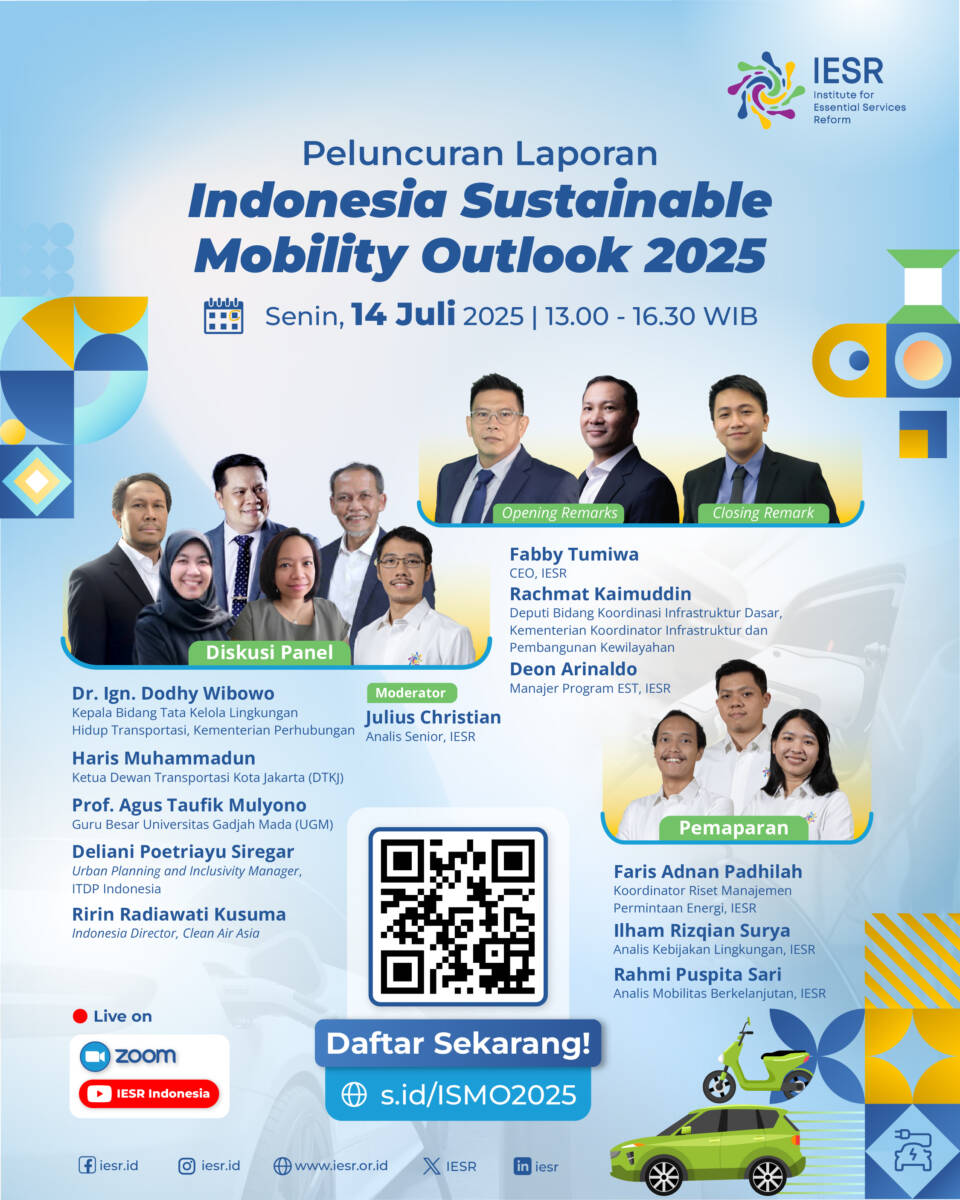
Report Launching Indonesia Sustainable Mobility Outlook 2025
Replay Event
Backgorund
Decarbonization of the transportation sector is an important strategy to achieve the net-zero target by 2060 or earlier and meet Indonesia’s emission reduction target according to the Enhanced Nationally Determined Contribution. Based on the Indonesia Energy Transition Outlook 2025 (IETO 2025) report by IESR, in 2023 the transportation sector produced the second largest GHG emissions in Indonesia at 160 MtCO2e. Around 65% of the total emissions came from land passenger transportation produced by cars (30.2%), motorbikes (24.8%), and buses (5.4%).
The growth in mobility and demand for transportation is a consequence of increasing socio-economic activities. Moreover, with the government’s target of 8% economic growth, it will increase the rate of community activity and cause a spike in emissions if there is no intervention. The implementation of sustainable mobility is an important strategy to overcome these problems.
In this regard, our study of Indonesia Sustainable Mobility Outlook 2025 (ISMO 2025) emphasizes a sustainable mobility strategy with the Avoid, Shift, and Improve (A-S-I) approach, namely by reducing and managing travel demand, collective transportation, and electromobility.
Travel demand reduction and management are carried out by building compact cities, non-motorized transport, and shorter trips management. The Avoid framework relies on mature city planning, including bringing economic locations (markets, offices, etc.) closer to residential locations.
Collective transportation encourages a shift from the use of private vehicles to low-carbon public transportation such as city buses and trains. Rail-based public transportation has the highest energy efficiency and the lowest emissions of all modes of transportation at 4.7%. Increasing the absorption of public transportation passengers is carried out by expanding the catchment area and integration between modes.
Electromobility focuses on improving vehicle technology through the implementation of electric vehicles, expanding charging infrastructure, and improving fuel quality. In addition to reducing emissions, the use of EVs will also reduce dependence on imported fuel whose prices fluctuate and burden the state’s finances.
The launch and discussion of the ISMO 2025 report aims to inform and spark discussions between the public and policy makers regarding recommendations for sustainable mobility in Indonesia. We hope that this study can provide technical considerations and act as an advocacy document to assist stakeholders in making policies related to transportation decarbonization in Indonesia.
Objective
- Disseminating the Indonesia Sustainable Mobility Outlook 2025 study with experts, practitioners, regulators, academics, journalists, financial institutions, and other relevant stakeholders.
- Providing a policy dialogue space for stakeholders with policy makers and business actors as well as civil society organizations in the process of formulating and implementing sustainable mobility policies.
- Increasing public awareness and support for sustainable mobility policies in Indonesia.
Presentation
Presentation of Indonesia Sustainable Mobility Outlook 2025 – Ilham Rizqian Fahreza Surya, Rahmi Puspita Sari, Faris Adnan Padhilah – IESR
Presentasi-Indonesia-Sustainable-Mobility-Outlook-2025-Ilham-Rizqian-Fahreza-Surya-Rahmi-Puspita-Sari-Faris-Adnan-Padhilah-IESRSpeakers
-
Fabby Tumiwa - Chief Executive Officer (CEO) - IESR
-
Deon Arinaldo - Manajer Program System Energy Transformation IESR
-
Rachmat Kaimuddin - Deputy Coordinating Ministry for Infrastructure and Regional Development
-
Irjen Pol. Hermanta - Head of Transportation Policy Agency - Ministry of Transportation
-
Haris Muhammadun - Chairman of the Jakarta City Transportation Council (DTKJ)
-
Ilham Surya- Environmental Policy Analyst - IESR
-
Faris Adnan Padhilah - Research Coordinator in Energy Demand Management Group - IESR
-
Rahmi Puspita Sari - Sustainable Mobility Analyst - IESR
-
Deliani Poetriayu Siregar - Urban Planning and Inclusivity Manager - ITDP Indonesia

